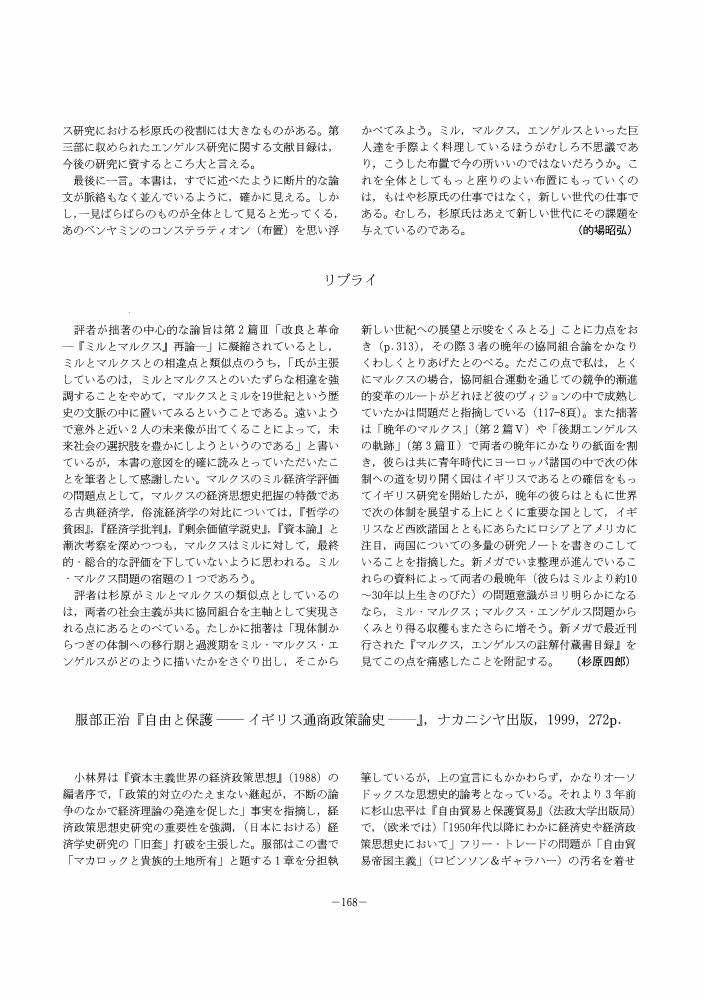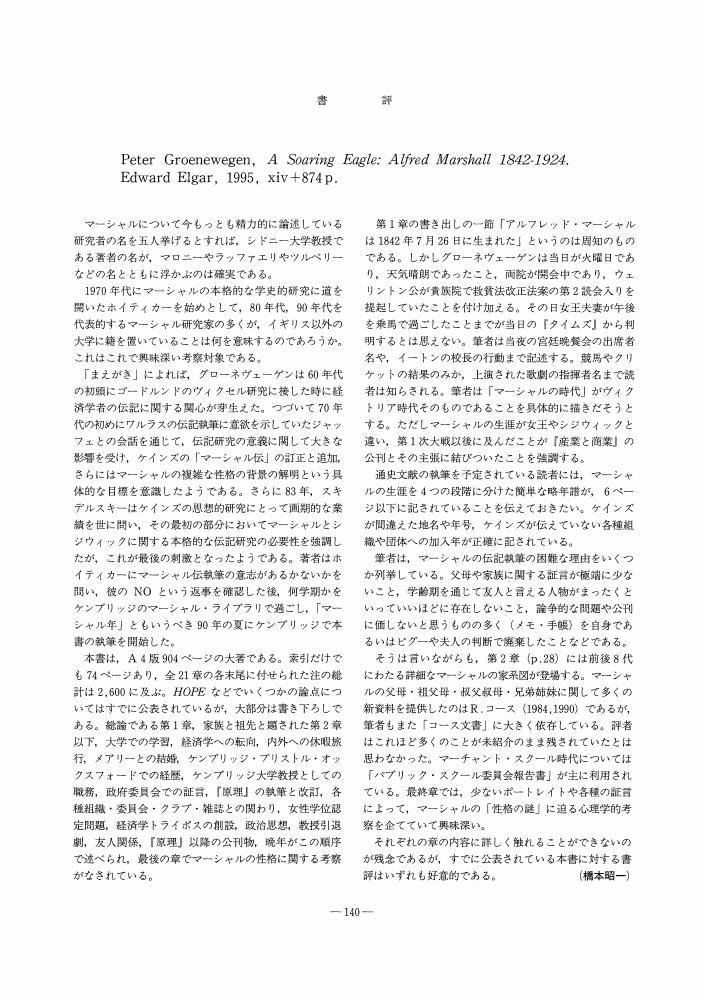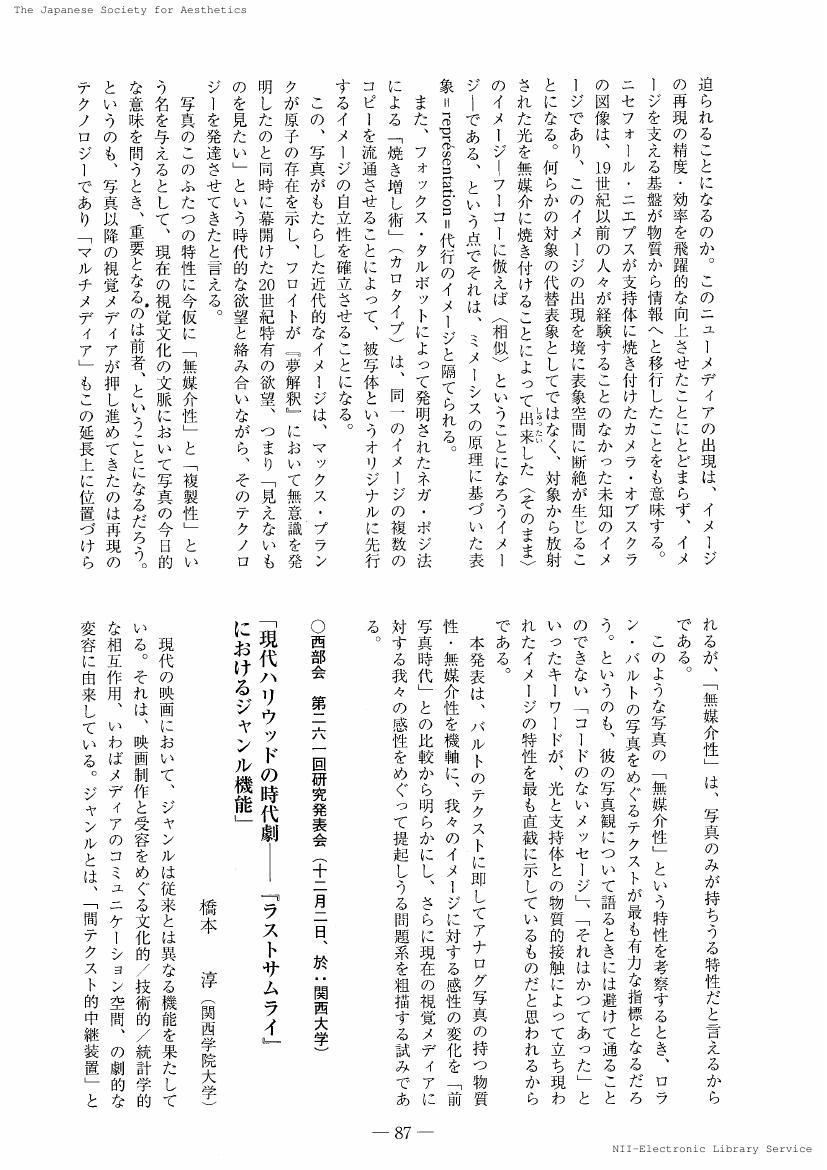1 0 0 0 OA 猪木武徳『自由の思想史』『自由の条件』
- 著者
- 橋本 努
- 出版者
- The Japanease Society for the History of Economic Thought
- 雑誌
- 経済学史研究 (ISSN:18803164)
- 巻号頁・発行日
- vol.60, no.1, pp.164-170, 2018 (Released:2019-09-03)
- 著者
- 橋本 努
- 出版者
- The Japanease Society for the History of Economic Thought
- 雑誌
- 経済学史研究 (ISSN:18803164)
- 巻号頁・発行日
- vol.59, no.2, pp.19-34, 2018 (Released:2019-09-02)
Abstract: This paper raises a fundamental question and offers an original framework on war and peace arguments based on primarily examining contributions in the field of war and economic thought after World War II. Among the prominent figures in this field, I select three thinkers in the field of economic thought, E. Schumacher, J. Galbraith, and K. Boulding, who present-ed their own systematic visions of a peaceful society. The fundamental question on war and peace raised here is, how we receive the principles of bios and eros, and of prosperity, from an ideally peaceful situation, wherein the nature of peace is defined as “the negation of bios” (i.e., the principle of death). In order to examine this question, I propose an original frame-work and define the concepts of war and peace using categories of conflict and violence. In light of this fundamental question, in this paper, I reveal the contributions of the three thinkers to our understanding of creating a peaceful world. First, I present the background and explain the reasons for selecting these three figures. Second, I present the fundamental question and my theoretical framework to explore the responses of the three thinkers to the question. Finally, I clarify their responses and present an overview of their contributions to-wards a peaceful society. JEL classification numbers: B 20, B 52, P 40.
1 0 0 0 OA 中山智香子『経済ジェノサイド――フリードマンと世界経済の半世紀』平凡社,2013年,296頁/服部茂幸『新自由主義の帰結――なぜ世界経済は停滞するのか』岩波新書,2013年,224頁
- 著者
- 橋本 努
- 出版者
- 経済学史学会
- 雑誌
- 経済学史研究 (ISSN:18803164)
- 巻号頁・発行日
- vol.56, no.2, pp.148-149, 2015 (Released:2019-11-30)
- 著者
- 橋本 努
- 出版者
- The Japanease Society for the History of Economic Thought
- 雑誌
- 経済学史研究 (ISSN:18803164)
- 巻号頁・発行日
- vol.54, no.2, pp.72-73, 2013 (Released:2019-10-31)
- 著者
- 橋本 比登志
- 出版者
- 経済学史学会
- 雑誌
- 経済学史学会年報 (ISSN:04534786)
- 巻号頁・発行日
- vol.45, no.45, pp.104-106, 2004 (Released:2010-08-05)
1 0 0 0 OA マーシャルとケンブリッジ学派
- 著者
- 橋本 昭一
- 出版者
- The Japanese Society for the History of Economic Thought
- 雑誌
- 経済学史学会年報 (ISSN:04534786)
- 巻号頁・発行日
- vol.39, no.39, pp.66-73, 2001 (Released:2010-08-05)
- 参考文献数
- 42
Marshall's theoretical and educational efforts and success in the field of economics was already highly appreciated even in his day. Nevertheless, it is a curious fact that almost all of his students and disciples at Cambridge or at other institutions have gradually hesitated to follow the lines he indicated. This is one of the reasons why he was called a ‘soaring eagle’ or ‘enigma’. In order to not only reassess Marshall's economic thought, but also to elucidate his attitude foward contemporary economists and their methodology, much important material has been published in the last decade, namely by Whitaker (1990), Raffaelli (1990), Groenewegen (1995), Raffaelli (1995), Whitaker (1996), Groenewegen (1997), Groenewegen (1998). These works consist of a new bulky biography, collected works of 8 volumes, more than a thousand items of correspondence, a collection of ‘unknown voices’ in response to Marshall's economics, critical essays, and Marshall's unpublished lectures. Also very beneficial for Marshall scholarship are materials such as The collected Works of Sidgwick (1996) and Fawcett (1995). In the beginning of the new century, we can start to analyze such questions as ‘Is Marshall a communitarian or a libertarian in his circle?’ In this case, we should like to include Sidgwick and Fawcett in the Cambridge Circle.
- 著者
- 橋本 昭一
- 出版者
- 経済学史学会
- 雑誌
- 経済学史学会年報 (ISSN:04534786)
- 巻号頁・発行日
- vol.38, no.38, pp.168-170, 2000 (Released:2010-08-05)
1 0 0 0 OA Peter Groenewegen, A Soaring Eagle: Alfred Marshall 1842-1924. Edward Elgar, 1995, xiv+874p.
- 著者
- 橋本 昭一
- 出版者
- The Japanese Society for the History of Economic Thought
- 雑誌
- 経済学史学会年報 (ISSN:04534786)
- 巻号頁・発行日
- vol.34, no.34, pp.140, 1996 (Released:2010-08-05)
- 著者
- 東 清二郎 橋本 努
- 出版者
- 経済学史学会
- 雑誌
- 経済学史学会年報 (ISSN:04534786)
- 巻号頁・発行日
- vol.33, no.33, pp.193-194, 1995 (Released:2010-08-05)
1 0 0 0 OA 頭皮脳波を使ったBMIによるコミュニケーション
- 著者
- 橋本 比登志
- 出版者
- The Japanese Society for the History of Economic Thought
- 雑誌
- 経済学史学会年報 (ISSN:04534786)
- 巻号頁・発行日
- vol.30, no.30, pp.105, 1992 (Released:2010-08-05)
1 0 0 0 OA マーシャル『原理』の方法的・思想的性格
- 著者
- 橋本 昭一
- 出版者
- The Japanese Society for the History of Economic Thought
- 雑誌
- 経済学史学会年報 (ISSN:04534786)
- 巻号頁・発行日
- vol.29, no.29, pp.12-16, 1991 (Released:2010-08-05)
- 参考文献数
- 9
1 0 0 0 OA 最近のマーシャル研究
- 著者
- 橋本 昭一
- 出版者
- The Japanese Society for the History of Economic Thought
- 雑誌
- 経済学史学会年報 (ISSN:04534786)
- 巻号頁・発行日
- vol.27, no.27, pp.48-54, 1989 (Released:2010-08-05)
- 参考文献数
- 125
1 0 0 0 OA マルサス会議とその成果
- 著者
- 橋本 比登志
- 出版者
- The Japanese Society for the History of Economic Thought
- 雑誌
- 経済学史学会年報 (ISSN:04534786)
- 巻号頁・発行日
- vol.26, no.26, pp.1-13,27, 1988 (Released:2010-08-05)
- 著者
- 橋本 昭一
- 出版者
- The Japanese Society for the History of Economic Thought
- 雑誌
- 経済学史学会年報 (ISSN:04534786)
- 巻号頁・発行日
- vol.24, no.24, pp.63, 1986 (Released:2010-08-05)
1 0 0 0 OA 西山久徳著『差額地代論の研究』文化書房博文社 1967年
- 著者
- 橋本 比登志
- 出版者
- The Japanese Society for the History of Economic Thought
- 雑誌
- 経済学史学会年報 (ISSN:04534786)
- 巻号頁・発行日
- vol.6, no.6, pp.28-29, 1968 (Released:2010-08-05)
1 0 0 0 OA 伊藤隆道のインテリア・オブジェクトにみる一九六〇年代のジャンル解体運動の意義
- 著者
- 橋本 啓子
- 出版者
- 美学会
- 雑誌
- 美学 (ISSN:05200962)
- 巻号頁・発行日
- vol.68, no.2, pp.143, 2017 (Released:2019-01-02)
- 著者
- 橋本 周子
- 出版者
- 美学会
- 雑誌
- 美学 (ISSN:05200962)
- 巻号頁・発行日
- vol.62, no.2, pp.13-24, 2011-12-31 (Released:2017-05-22)
Dans cet article, nous souhaitons eclairer le concept de gourmandise selon Brillat-Savarin par la lecture de son texte. Dans les recherches precedentes sur l'histoire de l'alimentation a Paris d'apres la Revolution Francaise, it est de coutume de decrire la vie a Paris comme une scene de carnaval. Dans ce contexte, le texte de Brillat-Savarin, qui est considers comme une sorte de symbole de la culture de la gastronomie francaise grace au succes de la Physiologie du gout (1826), n'a pas ete suffisamment analyse jusqu'a aujourd'hui. Bien que le titre nous false imaginer qu'il admire completement le <<gout>>, la chose la plus importante pour l'auteur fut en effet le plaisir modeste donne par la <<convivialite>>, qui est a l'ecart du plaisir sensuel du <<gout>> physique. Nous considerons d'abord son approche de justifier l'acte de gourmandise, non comme un vice mais comme un acte recommandable pour l'entretien du corps. Ensuite, apres avoir vu comment it transpose cet argument au niveau de la morale de la societe, nous considerons la tendance de son concept de gourmandise qui tend a rapprocher le plaisir de la sociabilite, quitte a mepriser le plaisir sensuel qu'il avait pourtant precedemment justifie.
- 著者
- 橋本 淳
- 出版者
- 美学会
- 雑誌
- 美学 (ISSN:05200962)
- 巻号頁・発行日
- vol.57, no.4, pp.87-88, 2007-03-31 (Released:2017-05-22)
1 0 0 0 OA 粘土を用いた芸術療法的アプローチを行う際の留意点
20世紀半ばにその名前が登場した芸術療法の技法は多様であるが、その中に粘土を用いた造形活動もある。粘土は立体的な表現が可能で、可塑性が高い、多くの人が幼児期に使ったことがあるなどの特徴を生かした利用をされている。本研究では、このような粘土造形を行った際の心理状態を数量的データにより調査することを目的とする。そのために、一般大学生40名を対象に粘土造形を試行させて、粘土に触った感想と制作物の題名を調査した。結果は、感想からは「手触り」や「素材の特徴」など10個のカテゴリ、作品の題目からは「動物」や「キャラクター」など7個のカテゴリが得られた。この結果から、粘土を扱うとその手触りから退行が促進され、癒しの効果が得られることが明らかになった。そして、粘土を触った感想は、思考、感覚、感情という3つのレベルから考えられることも分かった。また、柔らかさを中心に手触りについての感想が多かった。さらに、粘土の使用はコミュニケーションツールにもなると考えられ、グループワークへの活用も期待できる。














